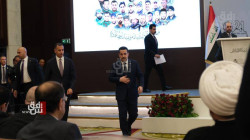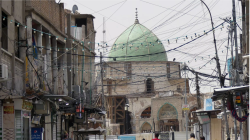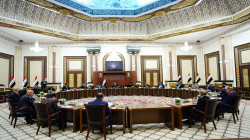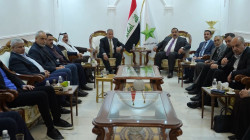Iraq's Al-Sudani in the line of fire: growing dissent over power monopoly and US, Kurdistan deals
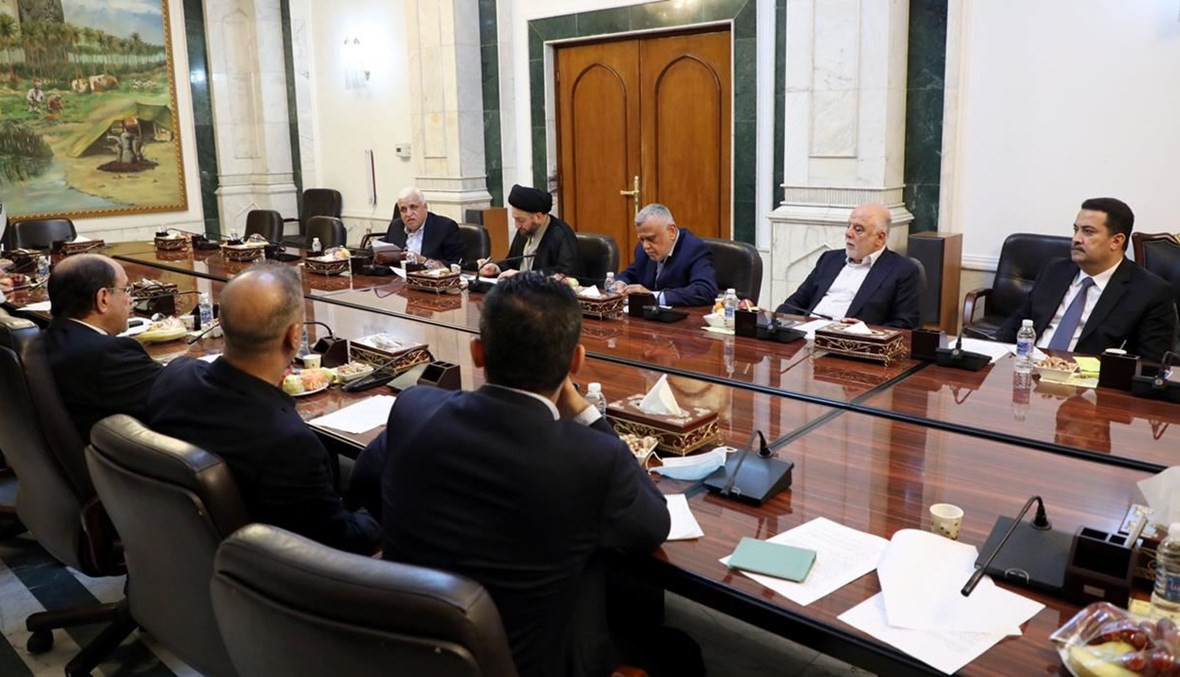
Shafaq News/ Iraq's Prime Minister Mohammed Shia al-Sudani is facing mounting internal pressure from factions within the powerful Shiite Coordination Framework, as accusations of power monopolization, incomplete political reforms, and controversial agreements with the US and Kurdistan Regional Government fuel growing discontent within his own ranks.
How Al-Sudani Came to Power
Mohammed Shia al-Sudani was selected on October 13, 2022, to lead a new government after months of political deadlock caused by internal disputes among major factions. His appointment ended a year-long crisis stemming from contested parliamentary elections. Later that month, Iraq's parliament approved his cabinet, officially making him the country's prime minister.
At 52, al-Sudani brought experience from his previous roles as Iraq's human rights minister and labor and social affairs minister. However, his rise to power was contentious. His nomination faced resistance from the movement led by Muqtada al-Sadr, a key rival in Iraq's Shia political landscape. Al-Sadr's faction boycotted the government, leaving a large group outside the political framework.
Al-Sudani's support came from the Coalition of the State Administration, including the influential Coordination Framework—a bloc of pro-Iran Shia factions controlling 138 out of 329 parliamentary seats. The coalition also included Sunni and Kurdish parties, such as the groups led by Parliament Speaker Mohammed al-Halbousi and the two main Kurdish factions, the Kurdistan Democratic Party and the Patriotic Union of Kurdistan.
In Iraq's post-2003 political system, which emphasizes power-sharing across ethnic and sectarian lines, al-Sudani's nomination by the Iran-backed Coordination Framework was significant. This bloc gained dominance in parliament after the withdrawal of al-Sadr's 73 lawmakers, part of a strategy to pressure rivals into forming a government. Al-Sadr's exit allowed the Coordination Framework to solidify control.
Despite securing the position, al-Sudani's appointment sparked public outcry. His nomination, announced on July 25, triggered widespread protests led by al-Sadr's supporters, who stormed the Green Zone in Baghdad, demanding his withdrawal. Undeterred by the unrest, al-Sudani proceeded to form his government.
Born in southern Iraq in 1970, al-Sudani's political career has been shaped by Iraq's turbulent history. Saddam Hussein's regime executed his father for ties to the Iran-backed Islamic Dawa Party. Al-Sudani played a role in the 1991 Shia uprisings, staying in Iraq while many others fled.
After the 2003 US-led invasion that toppled Hussein, al-Sudani held several government roles, including mayor of Al-Amarah in 2004 and governor of Maysan. Under Nouri al-Maliki and Haider al-Abadi's administrations, he served as human rights minister (2010-2014) and labor and social affairs minister (2014-2018).
In 2020, amid mass anti-government protests, al-Sudani resigned from the Dawa Party, which was facing accusations of corruption. Some analysts suggested that his ambitions for higher office likely drove this decision, distancing himself from the party's internal issues.
When former Prime Minister Adil Abdul-Mahdi resigned in 2019 after deadly protests, al-Sudani was considered a successor, alongside then-caretaker Prime Minister Mustafa al-Kadhimi. However, under pressure to nominate someone acceptable to protesters, al-Sudani withdrew his candidacy.
By 2022, al-Sudani led the Euphrates Movement, which secured three parliamentary seats in the prior election. His alignment with the Shia Coordination Framework, now the largest bloc, strengthened his bid for prime minister.
Al-Sadr's withdrawal from politics on August 29, 2022, deepened the political crisis. His supporters stormed parliament again, leading to violent clashes that left at least 30 dead. These protests were driven by widespread frustration over corruption, the ruling elite, and foreign influence in Iraq. Demonstrators strongly opposed al-Sudani and figures like Nouri al-Maliki, accusing them of corruption and poor governance.
While al-Sudani continues to manage Iraq's complex political environment, he now faces rising opposition within the Coordination Framework over his handling of critical issues, including unfinished political reforms, accusations of power concentration, and agreements with the US and the Kurdistan Regional Government.
Power Monopoly Claims
Rahman al-Jazaeri, a leader in the State of Law Coalition, told Shafaq News that "recent meetings have revealed that part of the Coordination Framework, including State of Law, is dissatisfied with al-Sudani's government, particularly over his failure to deliver on the political agreement and his lack of seriousness in completing the project endorsed by the Framework."
Al-Jazaeri further criticized al-Sudani's leadership, accusing him of "monopolizing" power by appointing individuals close to his tribe to key positions, including the recent appointment of Mohammed Juhi to the prime minister's office. "This affects the Framework's approach to leadership changes in the premiership," he said.
He also condemned al-Sudani's "unilateral" decisions concerning the Kurdistan Region, particularly in allocating funds without holding the regional government accountable for overdue payments to Iraq's Ministry of Finance. "These actions were taken without consulting the Framework," al-Jazaeri added.
The State of Law senior official noted that some members of the Framework are also discontented with al-Sudani's agreements with the United States, which include decisions affecting Iraq's economic situation, such as cutting salaries of Popular Mobilization Forces (PMF) members and closing certain banks. The recent protests and al-Sudani's failure to expel US forces from Iraq have further fueled opposition within the Framework, al-Jazaeri said.
Opposing Factions, Potential Protests
However, al-Jazaeri acknowledged that another faction of the Coordination Framework supports a second term for al-Sudani, including the bloc led by Labor Minister Ahmed al-Asadi, Asa'ib Ahl al-Haq, led by Qais al-Khazali, and allied groups. He also speculated that the Victory Alliance (Al-Nasr), headed by former Prime Minister Haider al-Abadi, and some civil and communist factions may align with al-Sudani's government.
"There is a split within the Framework," al-Jazaeri said, "between those who support him to continue his term and those who oppose his continued leadership." He warned that opposition factions might organize protests similar to the mass "Tishreen" demonstrations that erupted in 2019 and suggested that unaligned political parties may join forces with these protesters.
Al-Jazaeri predicted that further opposition could lead to a "million-man march," similar to the protests that forced the resignation of former Prime Minister Adel Abdul Mahdi.
Al-Sudani's Nomination and Growing Popularity
Political analyst Mujasha al-Tamimi told Shafaq News that al-Sudani's nomination by the Coordination Framework for the premiership was initially driven by the need to manage the conflict between the Sadrist Movement and the Framework.
"The Coordination Framework nominated al-Sudani reluctantly, as he was the last political figure under their umbrella," al-Tamimi said. "Other candidates were ruled out to avoid provoking the Sadrist Movement."
Al-Tamimi explained that al-Sudani was seen as a neutral figure who could bridge differences within the Framework and avoid antagonizing the Sadrist Movement or the Tishreen protesters. However, al-Tamimi added that al-Sudani's growing popularity has now become "a source of tension within the Framework, particularly as his political rise could reduce their parliamentary influence ahead of future elections."
"The growing popularity of al-Sudani may negatively affect the parliamentary strength of the Coordination Framework," al-Tamimi said, warning that this could lead to internal divisions if al-Sudani participates independently in the next elections.
Early Political Rivalry
Sabhan al-Mulla Ji'ad, a political advisor to al-Sudani, attributed the opposition to early party competition ahead of the next elections. He told Shafaq News that some factions fear al-Sudani may form a new political bloc that transcends traditional sectarian lines.
"These objections are likely fueled by concerns that al-Sudani may lead a cross-sectarian bloc in the next elections, given his growing popularity," Ji'ad said, noting that much of the criticism stems from political and personal interests.
Ji'ad dismissed claims of al-Sudani's underperformance, highlighting his government's record on overseeing projects and monitoring financial expenditures. "Al-Sudani's government has been the best-performing since 2003," he said.
Despite the internal disagreements within the Coordination Framework, Ji'ad downplayed the rift, calling it a natural political difference that could be resolved through negotiation. "There are no major fractures within the alliance," he concluded.
